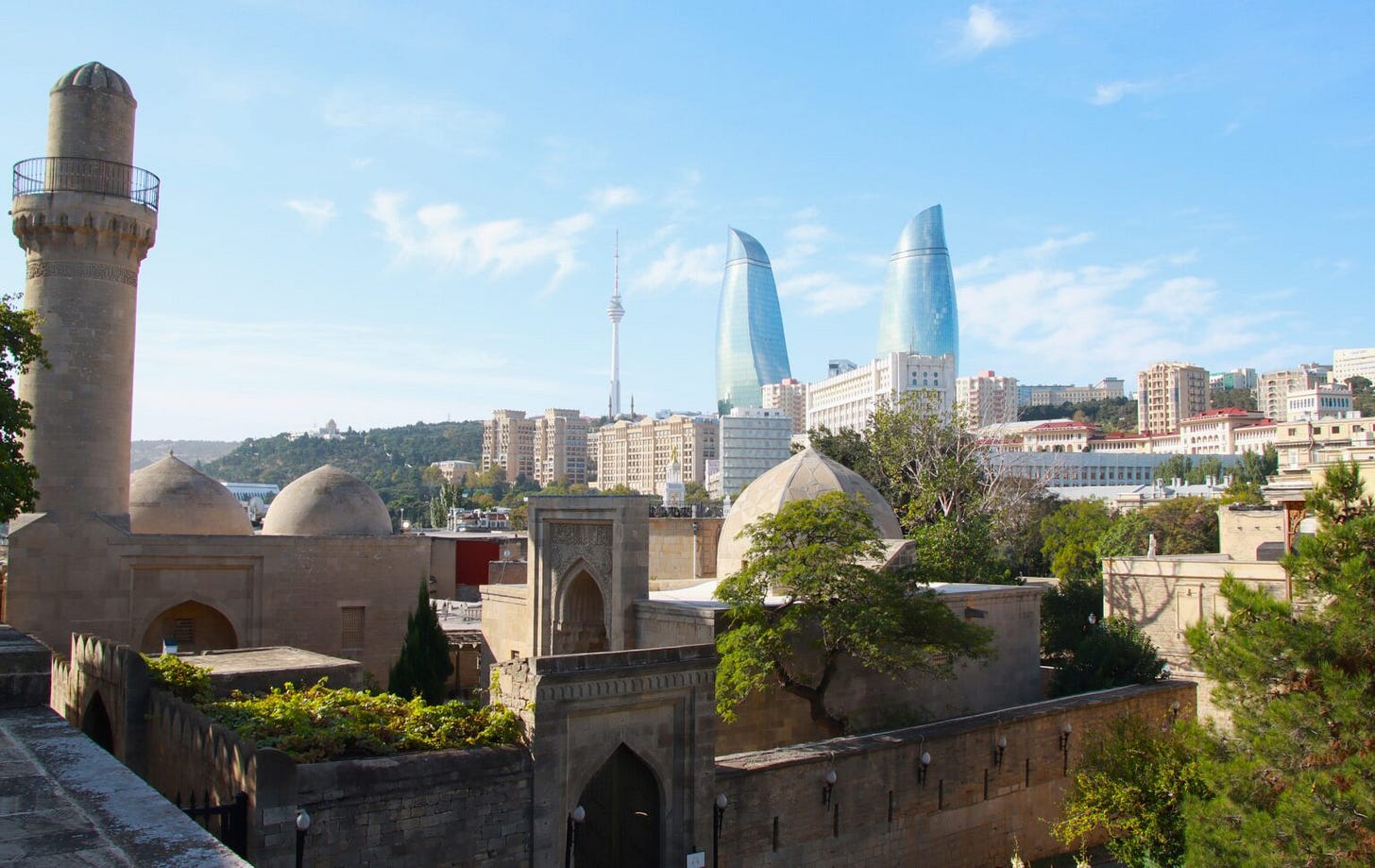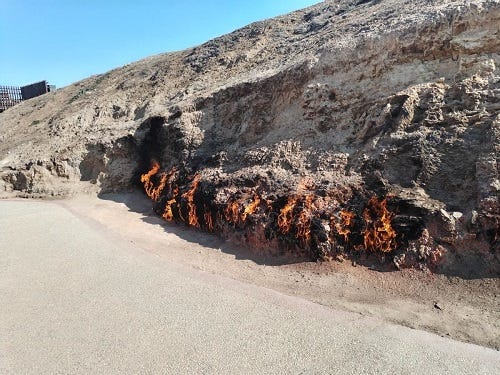Yogis and subsidy chasers gather for climate change convention
New Agers aim to replace humanity at heart of Abrahamic religion
Muslim host of COP29 says 'Oil and gas is a gift from God'
Why not let wind and solar put the Russians out of business?
Yet Europe, Asia, U.S. are piling into Gaza's gas fields after Oct 8th invasion
It is not ‘fossil fuels’ that will drive us extinct but the the competition for them
(1,900 words or about 10 minutes of your company)
Related:
Eurasia note #72 - Tourist Batumi's Lessons For Today - A idiosyncratic oil port reveals the highs and lows of industrial planning (Mar 03, 2023)
Mad World Of Climate, Green De-Growth & War - Decentralised energy and power is the answer (Nov 02, 2024)
Europe, Gas And The Endgame (Sep 30, 2022)
Nov 11, 2024
COP29 organisers lament they've made little progress, fixated as they were on the return of president-elect Donald Trump.
Without the U.S. to pick up the bill, there is no Kamala-esque joy to be copped at the annual junket in Baku. Recall that Trump pulled out of the Paris Climate Accords in 2017.
The organisers of the 29th session of the Conference of the Parties (COP29) to the United Nations Framework Convention on Climate Change, want money to cope with extreme weather — $1 billion a day — and another $1 trillion a year to pay help developing countries adapt to Net Zero, C02, renewable energy... and associated carbon markets.
Organisers are antsy. By tomorrow we may have something positive to report. Stay tuned.
Europeans are on the hook for the war in Ukraine. The re-elected Trump is talking of reviving U.S. energy production to boost industry, while reducing competition from imported goods via tariffs.
Australians, like Europeans, are wondering why they must shut down their energy capacity and suffer higher prices if China is increasing its hydrocarbon use.
As for the host of the COP29 climate fest, Azerbaijan's president Ilham Aliyev said, “Having oil and gas… It’s a gift from God.”
And in keeping with the injunction to "be fruitful and multiply, and replenish the earth and subdue it" Aliyev said his country would be increasing investment in extraction and production, since oil and gas would be needed for “many more years.”
Shell game
The European Commission under gauleiter Ursula von der Leyen wants to replace Russian gas with Azerbaijan's.
The current five-year deal with Ukraine to transit Russian gas expires at the end of this year. Kyiv is balking at renewal.
Azerbaijan is keen to fill the gap but pipeline bottlenecks limit its current capacity to meet Europe's needs. Some say it is proposing a swap deal with Russia. In other words Europe would still buy Russian gas, but via a contract with the Azeris.
Baku-based SOCAR and Slovak state-owned gas buyer SPP dismissed reports of a European deal to increase imports from Azerbaijan. [1]
Gas, like oil and coal, is happily one of the most fungible products.
Home of the gushers
Azerbaijan is home to the original gushers.
In the 13th century the Venetian explorer Marco Polo observed in modern-day Baku “a spring from which gushes a stream of oil.”
Vessels would be aligned to catch the gushing oil. Gushers, or blowouts, were wasteful and harmful, yet in 1887 blowouts still accounted for 42 percent of recovered oil. By 1890 it had decreased to 10.5 percent. [2]
Marco Polo had travelled, from the landmarks he mentions including Mount Ararat, across Armenia, close to the northern border of Georgia. He mentions Baku by name.
He may have visited Yanar Dag, where natural gas seeping through sandstone has burned continuously for thousands of years.
These flames, giving the name land of fires. are referenced by Baku's three matching buildings called the Flame Towers, meant to represent natural gas flares and the elements of fire.
French-Azeri writer Banine describes in Days in the Caucasus (1945) how fortunes were made overnight in the early 20th century.
The big names are familiar: Alphonse de Rothschild, the Nobel brothers Ludvig and Robert — whose sibling Alfred produced dynamite and the prize — and belatedly J.D. Rockefeller.
Between 1898 and 1901, the Azerbaijani oil industry, as part of the Russian empire, exceeded the U.S. oil production level. In 1885, the British journal, Engineering, surveying Baku's oil industry since 1864, wrote:
"Within two or three years Russia will be able to gain control over the markets in Northern Europe.
"In the near future, Baku will be a strong competitor of the U.S. in countries bordering the Black and Mediterranean seas, not to mention, the Far East and India."
This would make the country a target for the oil majors who would squeeze prices higher by taking Russia out of the market.
This would be brought to a halt by the "revolutions" of 1905 and 1917. Russian oil output would not recover to its 1900 level for half a century.
Oil and geopolitics
Nothing excites great power politics like energy resources.
In October, just after the eruption of bloodshed in Gaza, the Israeli Ministry of Energy and Infrastructure said it had awarded concessions for natural gas exploration to Israeli and foreign companies in zones that overlap with the maritime borders of Gaza.
Keep reading with a 7-day free trial
Subscribe to Moneycircus to keep reading this post and get 7 days of free access to the full post archives.




